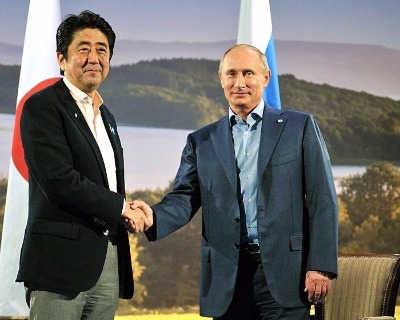Japanese financing push seeks to thaw Russia relations
Relations between Japan and Russia have been historically marked with territorial disputes and security concerns but recent deals suggest this frosty diplomacy may be thawing. Japan’s government has seemingly pushed financiers into increasing their financing to Russian banks and companies in a push to improve relations.

Relations between Japan and Russia have been historically marked with territorial disputes and security concerns but recent deals suggest this frosty diplomacy may be thawing. Japan’s government has seemingly pushed financiers into increasing their financing to Russian banks and companies in a push to improve relations.
Russian President Vladimir Putin and his counterpart Japan’s Prime Minister Shinzo Abe are meeting this week to discuss greater cooperation between the two countries. The past year has seen a flurry of financing arrangements take place which look set to deepen their economic and security relations.
Just two weeks ago, SMBC and Mizuho announced a deal to provide €800 million ($845 million) in financing to Russian oil company Gazprom.
SMBC is also providing financing to Russian private bank Alfa-Bank to launch a borrowing scheme for Russian small and medium-sized enterprises (SMEs) and midcaps. The scheme was completed alongside the Japan Bank for International Cooperation (JBIC), with guarantees from fellow export credit agency (ECA) Nippon Export and Investment Insurance (Nexi).
JBIC has been involved in a multitude of deals in the past 12 months, with the Japanese government keen to push deeper into Russian oil and gas projects despite the sanctions currently in place parts of the economy.
Dr James Brown, associate professor of political science at Temple University Japan, tells TXF: “The Japanese government is very keen to increase investment in Russia and they want that to be broad based.
“They want not just JBIC but also the commercial banks to be involved but the problem is the commercial banks are very reluctant to get involved as they are concerned about sanctions, particularly American ones.”
JBIC agreed to lend Russian bank Sberbank 4 billion yen ($39 million) in October. Sberbank will on-lend the funds to the operator of Vostochny Port, which will purchase equipment from Japanese companies.
The Japanese ECA also plans to loan €200 million ($211.5 million) to the Novatek-operated Yamal liquefied natural gas (LNG) plant, concluding the financing for the $27 billion project.
This increased interest in energy infrastructure comes amid reports suggesting that JBIC may also help finance the expansion of the Sakhalin-2 LNG plant on Sakhalin Island. JBIC provided $3.7 billion in 2008 to build the plant as part of a $5.3 billion project finance deal.
JBIC’s activities in Russia also extend to a 100 billion-yen ($901 million) fund alongside the Russian Direct Investment Fund to provide financing for several development projects. Similarly, JBIC signed a memorandum of understanding (MoU) with two Russian government organisations to promote Japanese investments into an ‘Advanced Special Economic Zone’ in Russia.
Islands in the stream?
Japan hopes the financing will help them negotiate over the contested Northern Territories or South Kuril Islands which were annexed by the Soviet Union during the second world war. The dispute has prevented Japan and Russia from signing a peace treaty following the war and remains a key contention between the two countries.
Ruth Lux, senior consultant at JLT Consulting, tells TXF: “Russia's strategy appears to be to consolidate its control of the Kurils, and remove any realistic hope Tokyo might retain of regaining control of the islands. In return, Russia will offer Japan more lucrative co-operation opportunities in its Far Eastern energy resources in return for an agreement that Tokyo will drop its territorial claims.”
Japan is unlikely to drop its territorial claims in the short to medium term due to strong domestic opposition. However, it is thought increased cooperation between the countries will improve the chances of greater dialogue in the future.
As Dr Brown tells TXF: “I think it’s all politics, it is about the islands but it’s also about Japanese security considerations as they are very worried about an assertive China – if Russia and China become closer then it’s a nightmare for Japan.
“Even if they don’t get the islands back their improved relationship with Russia will aid their security concerns.”
While this week’s talks may not guarantee any immediate end to the ongoing dispute, the clear signs of cooperation between Russia and Japan may yet help to turn the tide on sanctions in the Eurasian state.
Developments in the US and France suggest further Western sanctions are unlikely and could lessen lender concern about ongoing and future financing projects in Russia by Japanese institutions.





